#black and white impermanence
Explore tagged Tumblr posts
Text

西遊記-
91- HeiWuchang 黑無常
#art#drawing#doodle#fanart#journey to the west#西遊記#Hei Bai Wuchang#Hei Wuchang#黑無常#黑白無常#black impermanence#black and white impermanence#100 journey to the west
10 notes
·
View notes
Text
Ghost in the League
So I just read AGIT and yes all the lore drop is absolutely beautiful I took so many notes, but.
Look at this pair of outfit Danny has when they glitch through time:


Now look at red hooded ninja Jason and ninja/warrior Danny:


Do anyone see my vision??
PS.: they both have similar weapons. Some kind of east asian style straight sword/dao:


PPS: Danny didn't get to actually fight in the that outfit which is a bummer, and Jason's sword may or may not have turned into a katana somewhere between scenes.
#dpxdc#dcxdp#danny phantom#danny fenton#jason todd#halfway through making this post I realized I never finished the post about black and white ghost#but that's what this is about#they don't have a specific name in the league other than ghost#but sometimes people call them black and white impermanence (the grim reaper equivalent in Chinese folklore)#white ghost danny#black ghost jason
411 notes
·
View notes
Note
Bai's hat in word of honor saying that fortune comes to those who meet him is true. I see him and I feel fortunate. He's a little fella. A perfect little guy. A lad. A friend, even.







A fortunate friend 🤍
#bai wuchang#hei wuchang#wuchang gui#white grim reaper#black grim reaper#impermanence ghost#changing ghost#word of honor#山河令#shan he ling#ghost valley#ask#my gifs
22 notes
·
View notes
Text
i think the only novel i had to stop because i really hated how the. i guess abuse kept happening was w.u cha.ng j.ie (censored to hide from tags hopefully). it was really bad on the reoffending angle. like to the point where even i was nauseated by it and that takes a bit
#mara reads#i tend to overlook a lot of things but in that novel i really couldnt. it wasnt 2ha tho#i think the min two characrers were OH WAIT#I REMEMBER THE NOVEL NAME NOW#main two characters are the black and white impermanence#sighs. i really wanted wu chang jie to be good too. main character was too much of a. horrible person for my taste#just too much#one of the few novels where i read it and sincerely hoped the main romance falls apart
2 notes
·
View notes
Text
A Guide to the Chinese Underworld (and what it isn't)
As many FSYY and fox posts as there were on my blog, I am actually a huge fan of the Chinese Underworld mythos. Mostly because I was once a morbid little kid that loved reading about the excavations of ancient tombs, and found the statues depicting hellish torture in the Haw Par Villa "super cool".
Apart from the aesthetics, the history of its evolution is also fascinating. Most of us, Chinese or not, only know the most popular version of the Underworld——the "Ten Kings" system, yet that isn't always the case. So today, I'll start off with a short summary of that.
In pre-Qin era, there was already this generic idea of a "Realm of the Dead" called the Yellow Spring, Youdu, or Youming, but we know very little about it.
Then, in the Han dynasty, two ideas start to emerge: 1) the Underworld is a bureaucracy, 2) the God of Mt. Tai ruled over the dead.
This early bureaucracy might not function as an agent of punishment; the main focus was on keeping the dead segregated from the living so they wouldn't bring diseases and misfortune to the latter, as well as using those ghosts to enforce collective punishments upon people for their lineage's wrongdoings while they were still alive.
Post-Han, after Buddhism entered China and took root, its idea of karmic punishments and reincarnation and the figure of King Yama was merged with folk and Daoist ideas of the Underworld bureaucracy, and, came Tang dynasty, resulted in the "Ten Kings" system that first appeared in Dunhuang manuscripts.
It was very rudimentary and far from well-established, as seen in Tang legends, with some adopting the Ten Kings system, some sticking to the Lord of Mt. Tai and some favoring King Yama, and overall little agreements on who's in charge of the Underworld.
But the "Ten Kings" system would become the mainstream version from then onwards, used in Ming vernacular novels and made even more popular by folk religion scrolls like the Jade Records (Yuli Baochao).
As such, most points in the following sections will be based on the fully matured "Ten Kings" system of the Underworld, as seen in the Jade Records and JTTW.
What happens when you die?
(This is a fictionalized walkthrough of the posthumous fate of souls under the "Ten Kings" system. I try to stick to the very broad progression outlined in the Jade Records, but many creative liberties are taken on the details.)
Let's say there's a guy named Xiao Ming, and he had just died of a heart attack. Bummers. What now?
Well, the first thing he saw would be the ghost cops.
There isn't really an unanimous agreement on who these ghost cops are: they may be a pair of ghosts in white and black robes, wearing tall hats (Heibai Wuchang), they may have the heads of farm animals (Ox-Head and Horse-Face), or they can just be generic ghost bureaucrats. For convenience's sake, let's say it was the first scenario.
"Who are you guys and where are you taking me?"
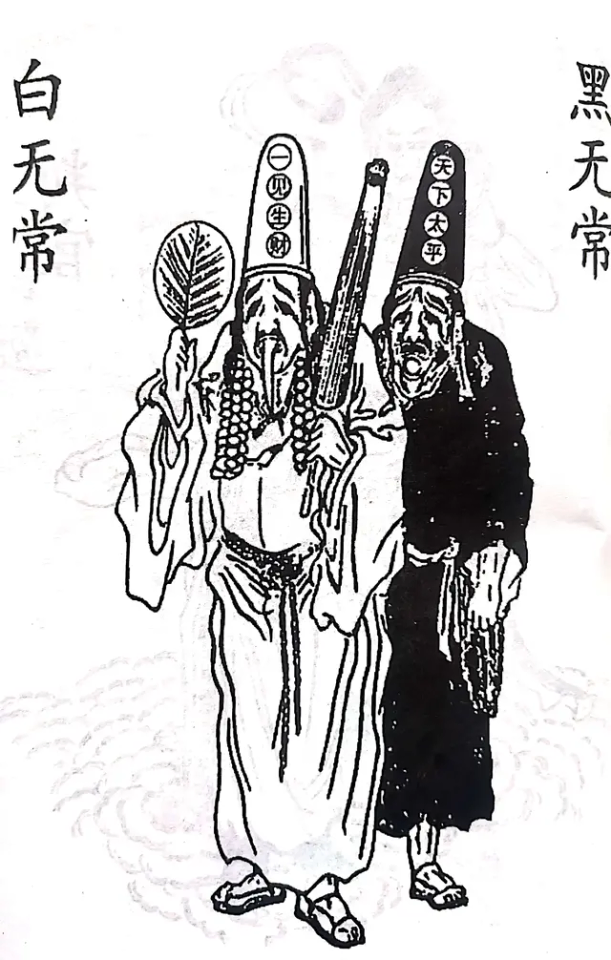
"Glad you asked!" The taller ghost cop, being the cheerful one of the pair, replied. It wasn't very reassuring, considering that his tongue was dangling out of his mouth way further than it should. "I'm the White Impermanence, my sour-looking colleague here is the Black Impermanence, and we are taking you to the City God's office."
This City God, a.k.a. Chenghuang, is just like how it sounds: the divine guardian of a city, who also pulls double duty as the head of the local Dead People Customs Office. They are usually virtuous officials deified posthumously, and in JTTW, they fall under the category of "Ghostly immortals", together with the Earth Gods a.k.a. Tudi.
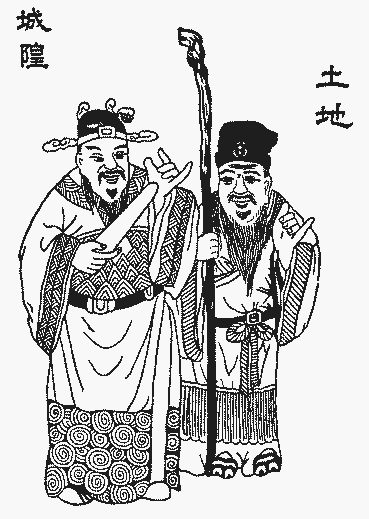
So Xiao Ming went with the two ghost cops——not like he had much of a choice, made his way through the long queue at the City God's office, and was now standing in front of a gruff old magistrate in traditional robes.
"Name?"
"Wang Xiao Ming."
"Age and birth dates?"
"21, April 16 2003…"
After he was done asking questions, the City God flipped through his ledger, then picked up a brush, ticked off Xiao Ming's name, and told him to go get his pass in the next room. More waiting in a queue. Wonderful.
"I never heard anything about needing a pass to get to the Underworld," the girl in front of Xiao Ming asked the ghost cops, who were standing guard nearby. "Is this a new policy or something?"
"Yeah. In the old days, we'd just drag y'all straight to the Ghost Gate." The ghost cop in black said, then muttered to himself, "Fuckin' paperworks and overpopulation, man…"
(This "Dead People Passport" thing was popularized in the middle-to-late Ming dynasty, as shown by the discovery of such documents inside tombs in southern China. )
(It might have evolved from similar passes to the Western Pure Land in lay Buddhism that recorded their acts of merits. Which, in turn, might be traced back to the "Dead People Belongings List" of Han dynasty, to be shown to Underworld bureaucrats so that no one would take away the dead's private property down there or something.)
Anyways, after he received his pass, Xiao Ming departed together with the rest of the bunch, to be led to the Ghost Gate. It was like the world's most depressing tourist group, where instead of tour guides, you got two ghost cops in funny hats, and the only scenery in sight was the desolation of the Yellow Spring Road.
They weren't the only travellers on the road, though. Xiao Ming noticed other groups moving in the far distance, behind the fog and the flickering ghostfire, led by similar figures in black and white.
It made a lot of sense; realistically, there was no way two ghost cops could fetch hundreds of thousands of dead people all by themselves.
(SEA Tang-ki mediums believed there were multiple Tua Di Ya Peks——Hokkien name for the Black and White Impermanences, working for different Underworld Courts.)
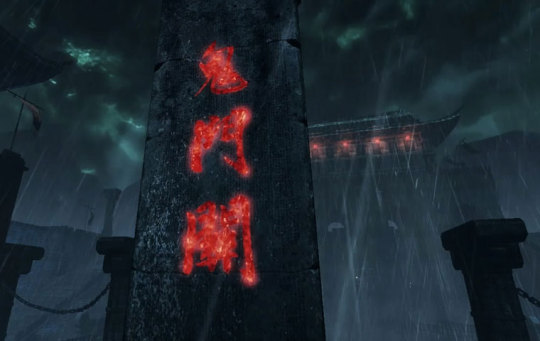
At last, the Ghost Gate stood in front of Xiao Ming, guarded by two towering figures. Normally, they'd be Ox-Head and Horse-Face, like what you see at Haw Par Villa's Underworld entrance.
However, older Han dynasty works like Wang Chong's 论衡·订鬼 also mentioned two gods, Shenshu and Yulei, as guardians of the Ghost Gate, who would use reed ropes to capture malicious ghosts and feed them to tigers, making them possibly the earliest incarnation of "Gate Gods".
So here, they were what Xiao Ming sees, standing side by side like proper doormen, silently watching herds of ghosts being funneled through the entrance.
The place was more crowded than a train station during the CNY Spring Rush; the ghost cops had already said their quick goodbye and left to fetch the next group of dead people, leaving the resident officials of the Underworld proper to maintain order and quell any would-be riots.
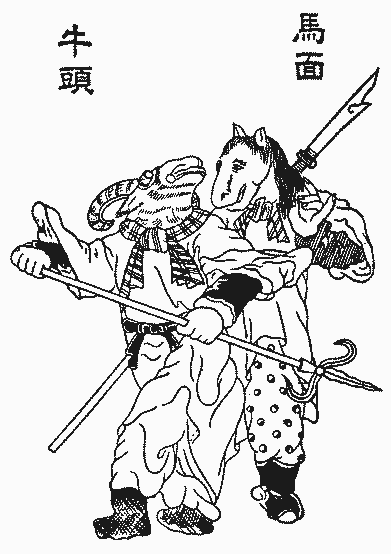
Now you started seeing the Ox-Head and Horse-Face guys, poking at unruly ghosts with their pitchforks and dragging away the violent ones in chains. Among their ranks were other monstrous beings, blue-faced yakshas and imps, but also regular dead humans who look 100% done with their jobs, like the lady who stamped Xiao Ming's pass when it was finally his turn.
After this point, Xiao Ming had entered the Underworld proper, and his next destination would be the First Court, led by King Qin'guang. Here, his fate should be decided by what is revealed in the King's magical mirror.
If Xiao Ming was a good guy, or someone who had done an equal amount of good and bad things in life, he'd be sent straight to the Tenth Court for reincarnation. However, if the mirror, while replaying his life events, had displayed more evil deeds than good ones, he'd be sent to one of the 2nd-9th Courts for judgment and then punished inside the Eighteen Hells.
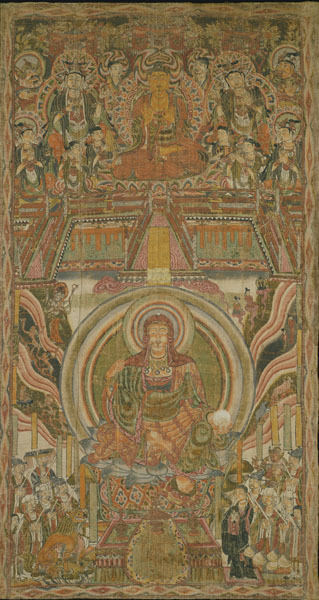
Each of the Ten Kings was also assisted by ghostly judges. Many of them were righteous and just officials in life who had been recruited into the Ten Courts posthumously——Cui Jue from JTTW is one such example, while others were living people working part-time for the Underworld, like how Wei Zheng, Taizong's minister, works part-time for the Celestial Bureaucracy in JTTW.
We decide to be nice to Xiao Ming, so, after reliving some embarrassing childhood incidents and cringy teenage phases in front of a bunch of dead bureaucrats, he was found innocent and sent to the Tenth Court.
The queue here was almost as long as the First Court's, stretching on and on alongside of the banks of the Nai River. King of the Turning Wheel made his judgment without even lifting his head when it was Xiao Ming's turn:
"Path of Humans, male, healthy in body and mind, ordinary family. Next!"
Exiting the Tenth Court building, Xiao Ming saw the Terrace of Forgetfulness, standing tall before six bridges, made of gold, silver, jade, stone, wood, and…some unidentified material. Before he could get a good look at them and the little dots moving across those bridges, he was hurried into the Terrace by the ghostly officials.
Now, both JTTW and the Jade Records mention multiple bridges across the Nai River. In the former, there is 3, and the latter, 6. The bridges made of precious materials are for people who will reincarnate into better lives, as the wealthy, the fortunate, and the divine, while the Naihe Bridge is either the common option or the terribad shitty option.
However, the Naihe Bridge proved to be so iconic, it became THE bridge you walk across to reincarnate in popular legends.
Anyways, back to Xiao Ming. He found himself standing in a giant soup kitchen of sorts, with an old lady at the counter, scooping soup out of her steaming pot and into one cup after another.
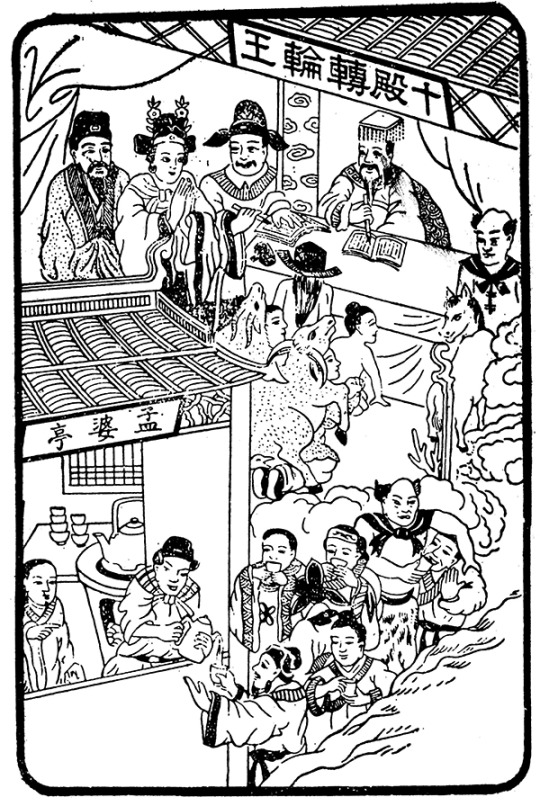
This is Mengpo, the amnesia soup granny; according to the Jade Records, she was born in the Western Han era, and a pious cultivator who thought of neither the past nor the future, only knowing that her surname was Meng.
Made into an Underworld god by the Jade Emperor, she cooks a soup of five flavors that will wipe the memory of the dead, making sure they do not remember any of their past lives once they reincarnate.
It tastes awful. Like what you get after pouring corn syrup, coffee, chilli sauce, lemon juice and seawater into the same cup.
Such was Xiao Ming's last thought, as he gulped down the soup, and then he knew no more.
Things you should know about the Chinese Underworld:
1. It's not the Christian Hell.
Rather, the Chinese Underworld functions somewhat like the Purgatory, in that there are a lot of torment, but the torment's not eternal, however long the duration may be. Once you finish your sentence, you get reincarnated as something else, though that "something else" is not a guaranteed good birth.
Other people can also speed up the process via transferring of merits: hiring a priest/monk to chant sutras and perform rituals, for example, or performing good deeds in life in dedication to the dead, or they can pray to a Daoist/Buddhist deity to save their loved ones from a dreadful fate.
Interestingly enough, a thesis paper I read mentions that, whereas Buddhist salvation from the Hells was based on transference of merits——you give monks offerings and pay them to chant sutras, so they can cancel out the sinners' bad karma with good ones, Daoist ideas of salvation tend to involve the priest going down there, sorting it out with the Underworld officials, and taking the dead out of the Hells themselves.
(The paper also stops at the Northern-Southern and Tang dynasties, so the above is likely period-specific.)
2. Nor is it run by evil demons.
Underworld officials are not nice guys and look pretty monstrous and torture the sinful dead, but they are not the embodiment of evil. Rather, the faction as a whole is what I'd call Lawful Neutral, who function on this "An Eye for An Eye" logic, where every harm the sinner caused in life must be returned to them, in order for their karmic debts to be cleansed and move on to their next life.
They can absolutely be corrupt and incompetent and take bribes——Tang dynasty Zhiguai tales and Qing folklore compendiums featured plenty of such cases, but that's a very mundane and human kind of evil, not a cosmic/innate one.
This is just my personal opinion, but if you want to do an "evil" Chinese Underworld? It should be a very bureaucratic evil, whose leaders are bootlickers to the higher-ups, slavedrivers to their rank-and-file workers, and bullies who abuse their power over regular dead people.
Not, y'know, Satan and his infernal legions or conspiring Cthulu cultists.
3. The Ten Kings are not Hades.
Make no mistake, they still have a lot of power over your average dead mortal. But in the grand scheme of things? They are the backwater department of the pantheon, who only show up in JTTW to get pushed around and revive the occasional dead people.
When Taizong made his trip to the Underworld, the Ten Kings greeted him as equals——kings of ghosts to the king of the living. If they see themselves as equal in status to a mortal emperor, then, like any mortal emperors, they are subordinate to the Celestial Host, and the balance of power is not even remotely equal or in their favor.
Also, it isn't said outright, but under the Zhong-Lv classification of immortals JTTW is using, Underworld officials will likely be considered Ghostly immortals, the lowest and weakest of the five types, much like Tudis and Chenghuangs.
Essentially: they are ghosts that are powerful enough to not reincarnate and linger on and on, spirits of pure Yin as opposed to true immortals, who are beings of pure Yang.
It's pretty much the shittiest form of immortality, the result you get when you try to speedrun cultivation (the Zhong-Lv text also made a dig at Buddhist meditation here), and if they don't reincarnate or regain a physical body, there is no chance of progressing any further.
Oh, and fun fact? In the Song dynasty, commoners and literati elites alike believed that virtuous officials in life would get appointed as ghostly officials in death.
However, the latter viewed it as a punishment. Which was strange, considering how they still held the same position and the same amount of authority, just over dead people instead of living ones, so there should be no big losses, right?
Well...it was precisely the "dead people" part that made it a punishment. See, a lot of the power and prestige they had as officials came from the benefits they could bring to their families and kins and native places, as well as the potential wealth and reputation bonuses for themselves.
A job in the Dead People Supreme Court would give them the same workload, but with none of those benefits. Since all the dead people had to reincarnate eventually, they couldn't have a fixed group as their power base, or keep their old familial ties and connections. At most, they could help out an occasional dead relative or two.
Like, working for the Underworld Courts was the kind of deadend (no pun intended) job not even living officials wanted for themselves in the afterlife. That's how hilariously sad and pathetic they are.
4. In JTTW at least, they aren't even the highest authorities of the Underworld.
That would be Bodhisattva Ksitigarbha, who is technically their boss, though he seems to be more of a spiritual leader than someone who is actually involved in running the bureaucracy.
Which makes sense, since he has sworn an oath to not attain Buddhahood until all Hells are empty, and his role is to offer relief and salvation to the suffering souls, not judging and punishing them.
Now, historically...even though Ksitigarbha in early Tang legends was still the savior of the dead, he seemed to be unable to interfere with the judicial process of the Underworld, merely showing up to take people away before they were judged by King Yama.
However, in the mid-Tang apocryphal "Sutra of Bodhisattva Ksitigarbha" (地藏菩萨经), he had evolved into the equal of King Yama, with the power of supervision over his judgements. By the time the Scripture on the Ten Kings came out, in artistic depictions, the Ten Kings had become fully subservient to him.
5. Diyu usually refers to the prison-torture chamber part, not the courthouse, nor is it the entirety of the Underworld.
And for the majority of souls that haven't committed crimes, they'll only see the courthouse part before they are sent to reincarnation. That's why I personally don't like, or use the name Diyu for the Chinese Underworld: I prefer the term Difu ("Earth Mansions"), which encompasses the whole realm better.
Also: even though historical sources like the Scripture on the Ten Kings and Jade Records seem to suggest that the dead were just funneled through this Courthouse-Prison-Reincarnation pipeline with no breaks in between, in practice, that isn't the case.
According to popular folk beliefs, after the dead were done with their trials/sentences, they stayed in the Underworld for a period of time and led regular lives, while functioning as ancestor spirits and receiving offerings.
Which would imply that the Underworld had a civilian district of sorts, populated by regular ghosts, making the whole realm even less of a direct Hell/Purgatory equivalent.
6. It is located in a different realm, but still part of the Six Paths and doesn't exist outside of reality.
In Buddhist cosmology, like the Celestial Realm, the Underworld is part of the Realm of Desires and thus subject to all the woes of samsara.
The pain and misery of the Path of Hell may be the worst and most obvious, but becoming a celestial being isn't the goal of serious Buddhists either: despite all the pleasures and near-infinite lifespan they enjoy, they are not free from samsara and will eventually have to reincarnate.
So if, say, the world is being destroyed at the end of a kalpa, all beings of the Six Paths will perish alongside it, leaving behind a clean slate for the cycle to start anew. The dead won't all end up in the Underworld and face eternal damnation.
7. The Black and White Impermanences would not appear in the Underworld pantheon formally until the Qing dynasty.
The concept that when you die, you get fetched to the Underworld by petty ghost bureaucrats is already well-established in Tang legends, but these were just generic ghost bureaucrats in all sorts of colorful official robes, with yellow being the most common color.
The idea of there being two specific psychopomps in black and white would only become popular in the Qing dynasty. Mengpo is kinda similar: although she existed before the Ming-Qing era as a goddess of wind, venerated by boatmen, her "amnesia soup granny" incarnation came from the Jade Records.
#chinese mythology#chinese folklore#chinese underworld#diyu#chinese religion#cw: death#hell#underworld#journey to the west#I'm lazy so if you want a “work cited” list#just dm me
2K notes
·
View notes
Text

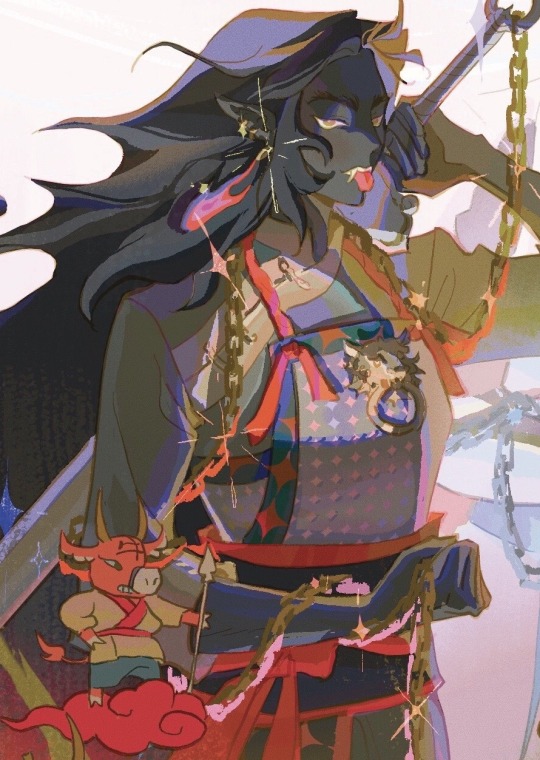

🤍你也来了 🖤正在捉你
黑白无常 / Black and White Impermanence, Chinese folk deities of the underworld as women with swords for Fight Like a Girl! Anthology !
#my art#girls and swords#as of posting this early June there are still zines and ebooks available at the store link!#thanks again to Andy for bringing this together ♥️#if you committed evil in life they arrest and torment you in death 🤷🏻♀️#also drew 牛头马面 as little guys lol
1K notes
·
View notes
Note
Hi I don’t know the difference between imagine or hcs ; I was wondering can I hear your thoughts on yandere monkey king x reader who’s the white bone lady please ; love to hear your thoughts (sorry if my English isn’t good 💗)
My thoughts, uh?
My thoughts... well, my thoughts are...
Before being the Lady Bone Demon, Reader was a mere, small, iey kind of spirit, like a fairy. She wasn't anything big, just a small creature that lived in the cold, turned to water during the hotter seasons, and waited until the cold came back and snow gave her her true form.
My thought is that she once met a small monkey, an intelligent one, and they became friends.
Every winter, he liked to pass it with her, playing and learning about the fun and the joy that even winter can bring. And he learned the pain that spring brings and the longing for her return in summer.
Years pass, and he changes. He became a dangerous demon, his name now Sun Wukong, and he had learned a new trick: how to make an ice spirit never wither.
My thoughts are that, at first, you found it quite nice to enjoy the hotter season, the flowers of spring, the fruits of the summer, and the fire-colored leaves of autumn, but as time passed, you wondered how long this thing would last... You miss the waters, your sisters, and your brothers... You would like to go back.
"Back?" He snarls, "Don't you like my gift?! Is this how you treat me?! YOUR KING?!"
But he wasn't your king, and you didn't like his way of acting.
And he didn't like your defiance, so he hurt you badly.
He cured you, using water and ice, but you remembered... and you started to wonder what was happening with him. Since when did he want to control you and keep you close to him? Since when have his eyes become dark? Since when did the small and friendly monkey become the demon that declared to love you like life itself?
You didn't want to give in; you were proud enough to not fall for threats and aggression. No matter any time he hurt you and rebuilt you, you didn't lose a single grain of hope to being free.
So, when the diamond ring came to capture him, you secretly asked for your father, the cold wind of the north, to guide it against him. Your father responded, and not only him.
When the celestials founded you, the ice fairy that the great Sage cherished as his own Queen, they found someone that was overjoyed by his fall and asked nothing but for your freedom!
But the damage was too deep now. He had fed you those damn pills and peaches; now not even the sacred fire could melt you... You felt helpless, near to giving up on your hope...
But the Mother of the West gave you another chance.
"There's a mountain, not far from the gate of the west," she spoke. "Go there and act in my name. Protect people, help them, and act as a guardian. Once your work is done, you'll find your immortality revoked."
History is written by the winners. Your name wasn't about death and bones; it was one about keeping company men in their last moment, helping them pass the threshold, and being there when the Black and White Impermanence came. You were there, guiding children in their home when they were lost, fending them from the dangers of the night. You were there to take away the tears from the face of the young lady.
You saved women that wanted to take away their lives; you were a saint.
Your name was Lady of White Reverance.
But he had to come back, did he? He had to meet your gaze when you kindly offered to help his master by bringing him food and water, remembering then all the years of torture, of imprisonment, and of seclusion by him. And he was fast to attack you, claiming you were a demon that wanted to eat his master. a lie, a dirty lie; he even tried to take you away again, bring you back to Mount Huaguo, promising to finish his journey and come back for you, to his wife. But you refused, and that angered him again.
Only this time, you were strong enough to fend him off.
In the story, he had killed you, but the truth was that you got away, and he is still alive, now searching for you.
#sun wukong#wukong#sunwukong#sun wukong yandere#yandere sun wukong#wukong yandere#yandere wukong#sun wukong x reader#sun wukong x oc#sun wukong x y/n#wukong x reader#wukong x oc#wukong x y/n#yandere x reader#yandere x darling#yandere x you#yandere x y/n#yandere#journey to the west#jttw#jttw sun wukong#m#the monkey king#monkey king#monkeyking#lady bone demon
77 notes
·
View notes
Note
One of my approaches to impermanence is the repetition of processes. One of my sensory things is rewearing the same clothes (generally not shirts/undies etc, but jumpers/jackets/shoes/shorts/skirts/jeans) every day for a while, and then when the weather changes or things need to be washed, I switch to something else and wear that repeatedly for a long while, and the cycle repeats. I'm less distracted by clothing when I'm accustomed to it, so every change in seasons brings both a sensory change from the weather and a sensory change from needing to wear different items of clothing.
I started a note on my phone titled "Seasons," and throughout the year I add things to it. So I can see suggestions of what clothes I like to wear at this time of year, how I like to arrange the bedding for the right temperature overnight, what foods to eat - including seasonal ingredients, but more autistically, things like what cold foods I can eat every single day for breakfast in summer vs hot breakfast foods every day for winter. And notes on how I rearrange elements of my daily routine, eg it's harder to get myself to do yoga in the morning when it's freezing cold; if I go for a walk at sunset, what time is sunset; I'm more likely to need to be flexible and have more than one shower per day during summer to prevent awful sensory shit from sweat, so I remember to have buffer time for that; if I'm having a cooked breakfast, that takes longer than cold cereal, but if I switch back to cold cereal for summer, I have to do the dishes deliberately not while waiting for porridge or congee to cook; etc.
This has really helped me a lot. There are some kind of fun things in there, like notes of when certain trees started flowering in different years, or when local annual events are on. But it's 98% about coping with changes to my routines and sensory coping strategies. It cuts out some anxiety and overthinking, and increases my subjective sense of control and familiarity and preparedness when facing another seasonal transition period.
It's made me wonder idly about coming up with other strategies based on a generalised approach of "treat change as a particular stage of a cyclical and repetitive process" - I think just looking at things that way makes it easier for me to step away from black-and-white, before-and-after thinking, unsurprisingly. But the specific example of annual seasonality has given me such an increased sense of control and reduced distress that I'm wondering what other specific, detailed strategies I might come up with one day too. We'll see.
This is fucking great. Your next response goes into this more, but it's all about developing a systematic understanding for how the various moving parts of life "work." I do something akin to what you are describing with the annual patterns of my workplace -- I know who is busy at which times of year based on new student orientation/graduation/finals/withdraw dates/etc, and plan a lot of my engagements around them.
66 notes
·
View notes
Text
BABY BLUE.

“Tell me you will live through this and I will die for you.”
You can imagine any of your favorite characters for this, but I was specifically thinking of Scaramouche/Wanderer, Albedo, Xiao, Alhaitham, Kaveh, Kaeya x fem! reader.
genre/cw: very soft spice, angst to comfort, fluff, some slight aftercare.
word count: 1.4 k.
To someone I cherish, this is for you. If you ever see it, I hope it brings you some semblance of comfort on nights that feel lonely. Even if I’m asleep, I’m on the other side of the screen, dearest 🩵

The rain falls.
Your palm rests against the cold window glass, drops splattered on the other side.
Raindrops.
Looking up at them, you could feel like flying to the grey heavens; you always liked the weather better when it was gloomy.
Shades of light blue seem contained in the still free falling rain, before it shatters against the dull concrete.
You could relate to that, one amongst millions, forgotten afterwards.
Only so many loved to splash in muddy puddles, after all.
With a sigh, you pull away from the blurry glass, the imprint of your hand outlined against the indigo hues of the approaching night.
Is that all the world will have to remember you by?
Are you really that… ephemeral? Impermanent?
Unimportant? Is the word that lodges into your heart, freezing it, each beat painting in dark blue your lips that used to smile, the fingers that used to caress him, so lovingly.
Wrapping your soft blue blanket around your form, you step towards your room’s balcony, the curtains an eerie muted cyan in the dim light. Knuckles white, you pull the crystal doors open, frigid rain almost piercing when it touches your skin.
And yet, it feels peaceful, it feels good.
Perhaps you just missed hurting in ways that were not emotional, and maybe the cold drops in the night provided that.
“I knew you’d be here.” A familiar voice pulls you out of your daze.
Startled, you turn around. Your hands tremble around you, your rumpled up blanket falling off your shoulder, your yellow sweater akin to a blue sun, the water splatters over it, storm clouds. Your hair is plastered against your face, its vibrant shade, ashen in the faint moonlight through decaying skies.
Sighing, his hand wraps softly around yours.
Warm. Loving.
Not his usual chill; not his dominant or fearing for you hold; not his usual teasing; not his trembling hold in twilights when he begged you to please not go.
Permanent. Grounding.
Your lover pulls you into him, under the awning, freezing cobalt bleeding into smaller sapphires when it hits the canvas.
He doesn’t care how you’re dampening his clothes, his hair, arctic hues spreading like watercolors to his core.
Carefully, he guides you inside, the warmth of your room welcome to your shivering form.
The wet blanket is lifted from you, hung on a low chair before the balcony’s doors, the dripping water pooling in a mirrored image of the half concealed moon.
Your partner’s arms hook under your legs, cradling you close, walking towards the bed.
He lays down by your side, svelte hands slipping your ochre sweater off of you. His hands caress your hips, the skin right above your black pants, and the skin under, when slightly calloused fingers slip beneath the turquoise silk of your underwear.
His own shirt meets the same fate as your discarded sweater, both yours and his trousers following after.
Scarred hands travel up and down your sides, his gem-like eyes reflected in your dilated pupils.
Tears shine like colorless emeralds in your lash line.
You want him. You need him. So bad.
But do you deserve him?
As if he was the only one privy to your thoughts, your lover’s hand laces with yours.
His gaze is comfortably piercing, completely set on your pretty face.
A gentle squeeze, before his hand slips delicately under your sports bra, unclasping it, alice blue fabric slipping off your frame.
“Beautiful.” He breathes, his stare dilating, his hands fondling with your breasts, gently pinching your nipples. He relishes in the little moans you let out.
Even if he never liked to see you cry, you were still perfect with teal eyeshadow running down your cheeks.
“My love…” you utter, a choked out sound. You want him to go on, but you want him to find better than you too.
And yet, he doesn’t think there’s anyone better, not here, not on any of the seven nations, not in another world.
“What is it, my bunny?” He whispers, kissing down your jawline, your neck, your collarbones.
You let out a shaky sigh.
“Are you sure? That I’m the one you want to do this with?” You ask, not meeting his gaze, head lowered.
“My dearest, look at me.” His tone is mellow when he takes your chin in between his fingers, gaze haloed in night and starlight, magnetized by you. “You’re the only one I want this with, the only one I’ll ever want. Do you understand?” The shadow of a smirk crosses his perfectly sculpted features when his lips brush the shell of your ear, feeling your frame shiver at his every touch.
All you can do is nod, throbbing and wetness starting to pool in your core, shades of pink and amber merging into the blue lighting of the night when his fingers brush your hipbone.
Skilled digits prod at your needy nub, thumb circling it, pearlescent juices leaking out of you.
You were always so perfect, and right now, you’re ethereal.
Reflected moonlight paints your skin azure, the city lights fiery against your hair, splayed out around the pillows.
Lips that have smiled, smirked, bitten and brought you endless pleasure envelop yours, his tongue swirling over the rosé of your parted mouth, asking for an entrance that was and would forever remain his.
His hardened tip teases your hole, as his arms wrap around your waist, bringing you impossibly closer, two colliding meteors, so bright, the sun would never need to rise again.
He enters you, in a melody of skin against skin and moans of yours and his name mingling in a million colors in the dark.
You can feel him. Deeply. Every vein and drag of his length spreading you out, taking you higher with every kiss of his tip on your sweet spot, to a vantage point from where you can see the skies end.
“I love you…” your boyfriend groans, pushing deeper inside you, one of his hands intertwining fingers with yours, the other, firm on your hip. “I love you, my darling… I’ll repeat it until you believe it… you feel so good, archons, you’re perfect.”
With one last forceful thrust, you feel your walls clamp around him, ribbons in a myriad of bright lights you only see after the nebula you and him create, painting your walls in every little detail that constitutes him and all the sheer adoration he holds for you.
Perhaps he once was a fallen god, now wandering in search of his own identity; or a broken angel, casting everyone in light, except for himself, donning a mask, kept in the shadows; maybe he is a crafted alchemist, still wondering about what it means to be alive; he could have been a silent scribe, caring more than his hardened stare let on, always peering from behind a book or another; at times you swore he was an artist, the architect that designed your very soul. Or maybe you’ve dreamed of him as a suave knight, his heart concealed behind a wall of spiky ice.
But what never changed is that his heart was always yours, in every version of the world, in every chapter of the story you still write, in the hours you dream away.
And so, you let go.
Liquid starlight coats him in your burning desire, as his nails dig into your skin, claw-like marks in his wake.
You’re a star, him, the moon, or the sun, that will forever orbit around the shine you don’t always see. Together, you meet the zenith of more than just entangled bodies, his lips descending upon yours once again tonight, feather-like this time.
With breaths mixed and labored, he pulls out, his arms not letting go, never letting go, for the gravity of you will forever tie him to your heart; even if his is hollow, icy, corrupted, or hard and gold, the threads of your sweetness are all he needs to feel alive.
Gently, your lover pulls the covers snug around you.
Summer sky blue, he sewed them himself. Or was it just his design? You can’t recall, but they are coated in him, his scent, his goodnight kisses.
Tender fingertips brush sweaty strands of hair away from your face. ‘So that I dream of you’, are his unspoken words, before his eyes close and his lips meet the tip of your nose.
In his arms, your lashes flutter closed too, in tandem with his.
Will you find wine and warm light on the other side? Lanterns to guide your night? Perhaps vast expanses of greenery with paths to find yourself and libraries to lose yourself in. Whatever the case, you hope for clear skies.
When dawn approaches, the baby blue of your now dry blanket matches the heart shaped rays expanding in the horizon.

#genshin impact x reader#genshin impact x you#genshin impact x y/n#scaramouche x reader#wanderer x reader#kunikuzushi x reader#albedo x reader#xiao x reader#alhaitham x reader#kaveh x reader#kaeya x reader#scaramouche x you#scaramouche x y/n#wanderer x y/n#wanderer x you#xiao x y/n#xiao x you#albedo x y/n#albedo x you#alhaitham x you#alhaitham x y/n#kaveh x y/n#kaveh x you#kaeya x you#kaeya x y/n#genshin impact imagines#genshin impact smut#scaramouche smut#wanderer smut#alhaitham smut
343 notes
·
View notes
Text

西遊記-
90- BaiWuchang 白無常
3 notes
·
View notes
Note
Hi! First off your blog is such an important resource for me in kimono patterns, thank you for keeping it! Secondly, a question. What patterns are associated with death? I know of spider lilies, and pure black kimono accessories for funeral wear, but otherwise not much else. I suspect that kind of pattern would be more of a novelty item print than an estabilished and used pattern.
Hi and thanks for your kinds words! Off the top of my head, they are several patterns associated with death, mostly linked to Buddhism.
Tbh, mourning attire for women are for me more an affair of colors (black/muted) and discreet not-celebratory patterns (it also depends of ones means). Novelty "death-themed"patterns are more and more present in modern kimono, yet you can also find "traditional" ones - even if they are on the rarer side.
Formal mourning garb, as you note, asks for mofuku (black kimono and obi with a few white accessories). Obi usually have very traditional woven ground patterns - for example ryuusui (running water) which kinda symbolize "the flow of life".
For the Buddhist anniversary of one's death and rememberance services, ladies would (when they can afford it) go from all black to half-mourning dress in muted colors like dull greys or ashen purple. For such occasions, you can find Buddhist patterns like sutra (Heart sutra especially), lotus flowers, gorintô (stylized stupa), etc.
More seasonal items could reference Buddhist Obon (festival of the dead) or Higan (more especially autumn equinox Shûbun), but such patterns for very specific events are on the rarer side, and more a matter of taste and style.
Patterns can include higanbana (spider lilies) for Higan, and for Obon: lanterns, cucumber or eggplant "spirit horse", hozuki (ground cherry), nod to Kyoto’s Daimonji kanji, or memento mori-themed motifs (like skeletons, nozarashi or graveplates).
As a step further into morbid imagery, another pattern which can sometimes be found, especially on men juban or haori lining, are decaying corpses (referencing Buddhist meditation on kusôzu or "nine stages of decay"). This was a subject in Japanese art, you can find an example here (cw: corpse depiction).
Hinting at Buddhist concept of impermanence and search for enlightment, Hell courtesan (jigoku dayû) with uchikake coats depicting hellish torments could also enter the death patterns category. Same goes for Buddhist hell imagery of Hell king Enma, or Hell guardians Gozu and Mezu (I believe I saw them on men juban/haori linings + on netsuke).
Finally, because we are talking of death, have a look at this super unsual and puzzling kimono depicting butsunehan (death of Buddha). Becky Mitsui's article is a wild ride xD
#ask#japanese patterns#kimono#obi#death#death imagery#mourning#obon#higan#buddhism#mofuku#heart sutra#skeleton#skull#nozarashi#graveplates#itatoba#sotoba#lotus#higanbana#spider lily#kusozu#nine stages of decay#jigoku daiyu#hell courtesan#Enma#jigoku#Gozu and Mezu#butsunehan#death of Buddha
128 notes
·
View notes
Text
one of the funniest things word of honor did was it had two guys who call themselves hei wuchang and bai wuchang and they’re besties, and they always wear this beautiful super detailed cosplay as the black and white guards of impermanence, they fight with scythes, everything. complete commitment to the bit. and then their boss calls himself wuchang gui and his outfit and weapons are 1. not even a little bit on theme and 2. fucking stupid. which means that either the other two were already a themed package deal when they became meng hui’s subordinates and he did the annoying corporate manager thing where he was like well i want to get in on this too, and does it poorly. or he was already calling himself wuchang gui and told his two new employees to maybe go along with the concept so it’s clear they belong to him, and the two of them were like alright sure. and proceeded to commit to the bit like no bit has ever been committed to before
41 notes
·
View notes
Text
Fushiguro Megumi, Shadow seen through the lens of Zen Buddhism:
[wherever there is light, there is shadow; wherever there is length, there is shortness; wherever there is white, there is black. just like these, as the self-nature of things can not exist alone, they are called non-substantial. - buddha]
➠ Megumi & the illusion of I and not I:
Within Zen philosophy, shadows are often interpreted as elements of mystery, the unknown, and impermanence, and represent the veiled aspects of existence that transcend human understanding. Much like impermanence, they are ever-shifting and constantly changing, mirroring the transient nature of life itself. At the same time, shadows are inseparable from light and their interplay reflects the interconnections and interdependencies of all things.
It is no different when it comes to a self. The shadow is not separate from a self, it is the very idea of a self.
It is important to note that Buddhism rejects the notion that the self is a permanently existing unchanging individual entity and sees the concept of self, ego, as a product of consciousness, which arises in a sentient being as part of the process of living i.e. consciousness itself is, at any moment in time, dependent on many things that are always changing, and consciousness itself is always changing, hence so too does the conceived self (when I use the term ‘self’ from here on, I am referring to the ‘conceived self’).
Another important thing to note is that Buddhism transcends dualistic concepts such as ‘Good vs. Evil’. It is the heart of Buddhism that Enlightenment sets one free from such false dichotomies, and from the cycle of suffering altogether.
However, when the Shadow, the unknown self, is not integrated into the self as a whole, one fails to recognise the non-dual nature of existence and may end up with a sense of ‘Goodness’ or ‘Rightness’. You separate the world as you separate the self, to attain gain from defining yourself and the world in a dualistic way. We see Megumi separate the world as such, the Good and the Bad or the Right and the Wrong. He integrates his entire sense of justice into the concept that helps him navigate the world in the most convenient way for him. He does not confront himself nor his ideals (although, he starts to, when he crosses paths with Yuuji, who does not truly fit his perceived idea of ‘Goodness’, but he justifies it, by laying the blame not only on Yuuji, but upon himself). Throughout the manga, it is clear that Megumi fears his Shadow (and the potential that lies in facing it), because he is afraid of what might peer back at him from the dark if he stands face to face with that part of his self (i.e. what if his perceived notions are wrong altogether).
However, what Megumi fails to recognise is that he loses his true sense of self by diving the world into ‘Good’ and ‘Bad’, and therefore, struggles to place himself in either of the categories. Tsumiki is good, so she must live a life free of suffering (or fairly). Yuuji is good, so he deserves to live. Where is Megumi’s place on that scale of ‘good’ and ‘bad’? He is not as good as his sister, he is not as kind as Yuuji, so of what value is his life? But on the other hand, he is not as bad as for example, Sukuna is, so his life cannot be completely worthless. Instead of seeing reality and accepting it for what it is, Megumi clings to his conceived idea of how the world (or people) is ‘supposed’ to be and it leaves him in a stalemate. He stays standing where he is, because he cannot imagine himself standing anywhere else.
In that same sense, he separates himself from his Shadow. For Megumi the Shadows are not a truly innate part of himself (an essence of being), but merely a Technique. A way for him to protect his perceived ‘Good/Right’ from ‘Bad/Wrong’ and because he cannot fit himself in either of the categories (not good enough or not bad enough), he cannot see himself as anything other than a tool. The world he has to navigate feeds onto his notions. In a way, Megumi has always been a tool, within the world of sorcery or outside of it, on an interpersonal level (but this depends on how one regards his relationships with Tsumiki and Gojo for example) and so, he continues to regard himself and his technique as such.
Megumi struggles to see beyond what is conscious, but the Shadow is what lies beyond his consciousness. Therefore, he has a hard time understanding himself and his technique on an innate level, because he can only see that which is conscious, the rest remains hidden in the Shadow, influencing his behaviour, creating reactive patterns within him, and distorting his perception of reality.
There is a concept called Non-dual Awareness in Buddhism, which refers to an awareness that transcends firm distinctions between oneself and the rest of existence. This is what we see Megumi struggle to cultivate throughout the manga when it comes to his technique (and sense of self). In a state of non-dual awareness, one understands that one is inseparable from the entire process of reality. Imagine you are standing in front of an ocean, looking at a single wave, is the wave still an ocean? The wave may have its own distinct properties, but it is also still clearly the ocean, i.e. it is both itself and the ocean at the same time. Such is the case with human beings. We are our individual selves, but we are also continuous with the particles that constitute everything in the known universe. Undertanding such, Buddhists see that selves are fuzzy and cannot be neatly defined. There is no objective boundary at which I end and the rest of reality begins.
➠ liberation:
How can Megumi reconcile with his Shadow, that unknown self?
The process of liberation within Buddhism is largely a process of gradually embodying the truths of non-duality and no-self, while learning to let go of your individual preferences, desires, expectations, and attachments. Through this process, we come to participate more fully and compassionately in our world, let go of fear, and accept the endless ebb and flow of all things. We resist nothing.
The way to liberation is to become an observer, a witness of your own mind. For Megumi to embrace his ‘full self’, he must embrace the impermanence of life (and therefore, self). And I believe where Akutami is leading him through all his suffering is that path of awakening, where Megumi is the Shadows and the Shadows are him.
To be continued...
[Disclaimer: This is only a personal opinion as just another reader. Additionally, English is not my native language and I have never read JJK in English, so certain terminologies I use may not be the correct equivalent of the English language.]
#i wanted to expand on different philosophical schools and how their concept of shadow intertwines with the buddhist idea of what shadow is#but this got longer than i expected so i will continue in the next part...#i just really hope akutami doesn't disappoint with what comes for megumi's character.#fushiguro megumi#jjk#jujutsu kaisen#megumi fushiguro#itadori yuuji#yuji itadori#fushiguro tsumiki
40 notes
·
View notes
Photo

it’s a matter of time!
5.6.23
1 note
·
View note
Text
Ghost Month Special: Heibai Wuchang
Today is the middle of Lunar Seventh Month, a.k.a. Zhongyuan Festival, and I feel like there can't be a more appropriate day to do a deep dive on my favorite ghost cops, a.k.a. the Black and White Impermanences, a.k.a. Seventh and Eighth Master, a.k.a. Tua Di Ya Pek, a.k.a. Xie Bi'an & Fan Wujiu.

Now, I've talked briefly about them in my Chinese Underworld post, and if you watch C-dramas or play certain Chinese games, you might have seen these two + learned a few things about them already. But for those who haven't, here's the five-minute summary:
-they are (one variant of ) Chinese psychopomps, who show up to take the souls of the deceased to the Underworld.
-they are also ghost cops, who go after troublesome ghosts that are disturbing the living.
-both wear tall hats with four characters on it (which also varied), as well as nearly identical black and white robes.
-for their Hokkien, Taiwanese and SEA versions, there's a significant height difference between the two; the white-robed one is tall and skinny, while the black-robed one is short and stout.
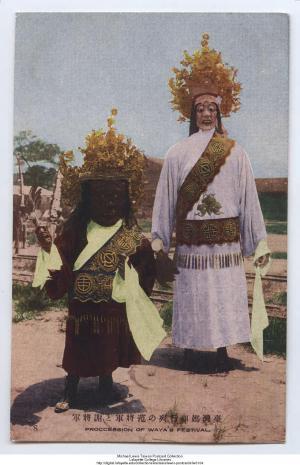
-the White Impermanence is often depicted with his tongue hanging out of his mouth (reminiscent of those who died by hanging) and a more cheerful expression, while the Black Impermanence is dark/blue-faced (reminiscent of death by drowning) and relatively more grim and fierce.
-the White Impermanence is also worshipped as a god of wealth by some.
However, outside of these bullet points, their tales and trajectory of development are a fascinating rabbit hole. I'd call them thorough folk gods, who evolved out of the greater existing character archetype of "ghost bureaucrats fetching people to the Underworld" and became their own unique characters almost entirely through folklore and oral legends.
So, without further ado, let's dive in.
Impermanence
The Great Spectre of Impermanence could arrive unexpectedly. (无常大鬼,不期而到) ——Sutra of Ksitigarbha's Fundamental Vows
To start talking about these two, we need to go into the general category of beings they separated out of later: Underworld officials.
Some conceptions of those petty ghost bureaucrats that mirrored living ones already existed in the Han dynasty; in burial goods and "grave scripts", there were paperwork dedicated to those officials, who were supposed to keep track of the Dead People Belongings List and maintain the segregation between the dead and the living.
Their characterization would get expanded a lot as time went on, in Northern-Southern dynasty and Tang legends, but this isn't an article about the ghost officials as a whole.
We are still tracing the origins of two specific ones, and to do that, we have to start with etymology——the "Wuchang" in their names.
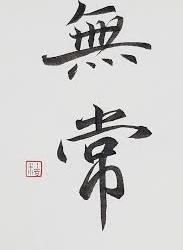
It is the translation of the Buddhist concept of "Anitya", referring to the impermanence of everything, which is always changing and dying and being reborn, with no constant to be found.
Yeah, you can see why a word describing the fleeting nature of life might eventually become associated with death and native psychopomps at some point in the Northern-Southern dynasty.
In the 39 chapter translation of the Dhammapada (interlaced with additional parables) by Fa Ju and Fa Li, the "Killing Spectre of Impermanence" (无常杀鬼) was first mentioned in the "On Impermanence" (无常品) chapter.
Another name for this grim-reaper-esque figure was "The Great Spectre of Impermanence", which appears in the quote at the beginning.
It appeared earlier than Ksitigarbha's Sutra, though: in another Northern-Southern dynasty translation of the Sutra of Golden Light, a Great Spectre of Impermanence was mentioned as this scary being that swallowed a king's younger son up whole.
By the Tang dynasty, the Spectre of Impermanence had appeared in both poetry and Buddhist text collections, as a generic name for the ghost that came to get you when you die.
However, the name wasn't exactly common or widespread, as made evident by all the N & S. dynasty and Tang legends about ghost bureaucrats where they were just referred to as, well, ghost bureaucrats.
Similarly, the Scripture on the Ten Kings doesn't mention anything about a Spectre of Impermanence. Instead, the second variant of the sutra says there are 3 ghosts working under King Yama——the "Soul-seizing Ghost" (夺魂鬼), "Essence-seizing Ghost" (夺精鬼), and "Spirit-binding Ghost" (缚魄鬼), responsible for dragging souls away in chains to the tree near the Underworld entrance pass.
(Their names might have corresponded to the idea of the Three Souls, each grabbing one of them, or the alternate division of Hun-Po plus the "vital force/essence".)
Right after that, however, they mentioned two demonic-looking birds sitting on the tree, one of which was named the "Bird of Impermanence", who would angrily scold and torment the dead for their misdeeds.
In this text, whatever the birds were, they were seen as a separate thing from the 3 ghosts that brought the souls of the dead to the Underworld entrance.
(A brief tangent about the 2 variants of the Ten Kings Scripture: the first could be found in the Dunhuang manuscripts, its name was 佛说预修十王生七经, and, as Teiser's translation of the scripture at the end of his academic book has showned, didn't have the 3 ghosts or the birds.)
(The variant mentioned above is 地藏菩萨发心因缘十王经, which is likely a Song dynasty Japanese apocrypha based on the first variant.)
Buddy Ghost Cops
When the ghostly officials of the Tang legends showed up, they could be alone, in pairs or in groups.
It was only in the Song-Yuan era that the idea of ghost cops showing up in pairs began to populate, and the first mention of the "Two Spectres of Impermanence" appeared in Vol. 3 of the Song dynasty 随隐漫录.
However, even without the word "Impermanence" attached, in various Song texts, the idea of there being 2 ghosts coming to get you instead of a single one or a group had already showed up with more frequency than before.
Come Ming dynasty, the Two Spectres of Impermanence got even more notable mentions in vernacular novels: a descriptive poem in Chapter 115 of Water Margins brings them up alongside the "Generals of the Five Paths" (五道将军), another native Underworld deity that showed up in Tang novels.
Plum in the Golden Vase, a.k.a. "that one Ming classic novel that often got censored and un-classic-ed because of its graphic sexual content", also has a folk Precious Scroll singing session (a story within a story, basically) that mentioned them.
In this story, King Yama sent a pair of "Impermanence Spectres" after Lady Huang, the protagonist of the scroll, who were also referred to as "Divine Boys/Acolytes of Good and Evil".
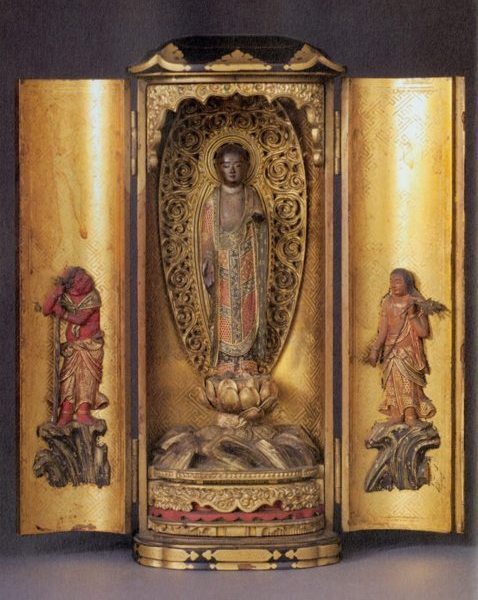
Now, the Boy-Acolytes of Good and Evil (善恶童子) were a pair of existing Underworld deities that had appeared in Dunhuang manuscripts and Ksitigarbha-themed artworks, responsible for recording the good and bad deeds of people respectively.
Their first mention was in the Tang translation of Surangama Sutra, and according to the second variant of the Ten Kings Scripture, the one recording bad deeds was said to look like a Raksha, while the one responsible for good deeds just looked like a regular divine acolyte.
Plum in the Golden Vase might have briefly aluded to that quirk too, in the story-within-a-story, where it was said that "Good people are welcomed by the acolyte(s), while bad people get the Yaksha(s)".
In the earlier Song dynasty compendium, Yijian Zhi, there are also mentions of two kids leading a fortunate guy's soul out of the Underworld, as well as showing up to inform some guy's wife that her days were numbered.
The second story is kinda funny, because after she had pretty much rolled over and accepted her fate, the two kids suddenly returned and were like "Excuse me, was Zhao your maiden name, or your husband's?"
Upon being informed that it was the latter case, they were like "Dangit, almost got the wrong person." Immediately after they left, another woman in the neighborhood whose surname was actually Zhao died.
Both stories do not use the specific name of "Acolytes of Good & Evil" for them, though, nor are they described as recorders of good and evil deeds.
For all I know, these two kids could be just like the pair of "young boys in blue robes" (青衣童子) who led Taizong into the Ghost Gate and the Underworld proper in JTTW Chapter 11: generic ghost workers.
But in Plum in the Golden Vase at least, they seemed to have been absorbed into the larger category of the Impermanence Ghosts, even though the Impermanence Ghosts still weren't their own characters yet, or gained any iconic uniforms.
Rather, it's more that 1) the catch-all name of "Impermanence" has become somewhat widespread for the generic ghost cops, though not yet universal, and 2) the Underworld apparently has a buddy-cop system in place now, where there had to be two ghostly officials for every newly dead person.
Psychopomp Outsourcing
In the late Ming and Qing dynasty, we got another twist on the Wuchang thing: Zou Wuchang, literally "Walk as Impermanences".
I've talked before about the early version of Taizong's trip to the Underworld, where Cui Jue/Ziyu, instead of being posthumously made a ghost judge, was a living official working part-time for the Underworld.
Well, Zou Wuchang is similar, but less prestigious, and you don't get paid either. The Underworld is short of hands (somehow), so they just grab a random living person and be like "Go fetch dead people for us."
The earliest mention of such a tradition in the Ming dynasty 语怪 placed the custom in Fengdu, the famous "ghost city" of Sichuan.
According to the text, when someone's soul was yanked off its streets to work as part-time psychopomps, they just fainted on the spot, and would revive after a few hours or overnight. The phenomenon was so common, the locals weren't even shocked, nor bothered getting them any medical attention.
Yuewei Caotang Biji goes further into the rationales of why Underworld needed those living conscripts. Apparently, all the living people clustered around a sickbed created a blazing aura of Yang, which certain venerable/fierce/brutish individuals also possessed in abundance, and was anathema to the ghost cops.
They were beings of pure Yin, after all, while the conscripts, whose bodies were Yin but still had plenty of Yang-aligned Qi, didn't have to worry about that.
Zou Wuchang was also not gender-exclusive, and there were mentions of multiple female conscripts in Qing legend compendiums.
Also, though the recruitment was forceful, you could actually retire after serving for a number of years——in one tale from 庸闲斋笔记, a woman fought the conscript for her mother-in-law's soul, who took pity on her and reported back to the City God.
In response, the City God said he'd send a report to Yama to see if she could be spared, and also released the conscript from her duty on account of her kind heart.
The popularity of this tradition across multiple sources and a long stretch of time signalled that, to an even greater extent than before, the ghost cops weren't generic ghost cops no longer: they are The Impermanences, which is only a few step away from developing into their own characters with unique iconography.
Black and White
First: where did their signature robe colors come from?
According to the first variant of the Ten Kings Scripture, officials under the Ten Kings were supposed to be dressed in black robes, riding a black horse, and carrying a black banner.

But in Tang folklore compendiums, that dress code wasn't a thing at all. A Taiwanese paper actually goes through tales of ghost officials inside Taiping Guangji where their appearances were described, and counted 22 cases of them wearing yellow robes, 7 cases of red robes, and only 8 stories involving ghost officials in either black or white robes.
Though ghost officials in black as well as white robes never appeared in the same story, they did have two things in common: 1) they tended to be quite tall, and 2) almost half of them were carrying weapons of some sorts.
The very late Ming/early Qing novel, Cu Hulu, also has a character ask Bodhisattva Ksitigarbha a bunch of questions in Chapter 12.
One of them was about the discrepancy between the depiction of Underworld officials in temples and the ones he personally saw, and he mentioned that the statues of "Impermanences" were 1) dressed in mourning robes and 2) about a Zhang and two Chi (3+ meter) in height.
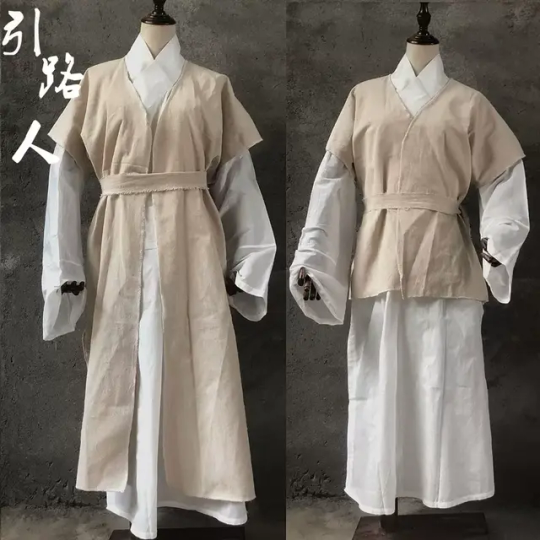
Which suggests that, by the novel's time, the ghost cops had already gained a set of uniforms, one associated with funerary affairs.
(Also: I love Ksitigarbha's answer to that particular question——"Yeah we used to have a really tall ghost cop like that, people just call him 'Wuchang' because they don't know what the heck he is. Also, Impermanence isn't actually a real name, it's a concept.")
However, as far as I know, the earliest mention of a pair of ghost cops, one in white and one in black, was in Vol. 19 of Yuewei Caotang Biji. And the story is quite funny.
Basically, this Sun guy was temporarily residing in someone else's house, and the host's mother was severely ill. One day, the family servant boy carried in some dinner for him, and because Sun was busy with something else, he told the boy to put it on a nearby table in another room.
Suddenly, a white robed guy just appeared out of nowhere and entered the house, followed by a short black robed guy.
Sun hurried into the room, saw the two guys stealing his dinner, and angrily yelled at them. The white robed guy noped out of there, leaving the black robed guy behind and hiding in a corner, unable to exit the room because Sun was blocking the door.
He kinda just sat outside and kept an eye on them for a while, before the host of the family suddenly showed up, telling him that his mother had just spoken.
Basically, the ghost officials had come for her, and one of them happened to be cornered in the room by Sun, so would he please move? She didn't want to be punished for showing up late.
The host didn't know if it was true either, and was just going out there and checking. But the moment Sun went and sat somewhere else, the ghost in black scampered out of the room. Soon afterwards, wailing began to come out of the mother's room, suggesting she had been taken away.
As hilariously pathetic as these two unnamed ghost cops are, the only thing connecting them to the Heibai Wuchang of much later times is their robe colors, and the black-robed one being short.
There are no tales featuring both 1) a pair of ghost cops in black and white, and 2) the pair being referred to as "Impermanences", though.
The middle-late Qing stories that do refer to the ghost cops as such tend to only feature a single Impermanence: unnaturally tall, dressed in white robes and hats, either holding a fan or carrying strings of paper money on his shoulders, sometimes bleeding from his eyes or nose/mouth.

(Yep, you know how the White Impermanence is often seen as the older of the two sworn brothers? As far as their historical existence goes, he really is the older guy.)
It was in the 19th century 醉茶志怪 that we saw the first signs of the two converging. In the three stories with "Impermanence" in their titles, two featured the "white-robed ghost cop in tall hat" alone, one of which described him as looking like a 10+ years old kid, standing at the side of the road like a temple clay statue.
The third story, however, featured a sighting of two giant ghosts, one in white and one in blue/green, near the City God's temple. Out of the four people involved in the encounter, three died after a few days, and the only survivor was the one who had his line of sight blocked by the palaquin.
How did 1 become 2?
How did the single unique Impermanence become the Black and White Impermanences?
Well…it's a complicated question with no definitive answers. We know that in the (probably Qing dynasty) Jade Records, there are already mentions of a pair of ghosts called Huo Wuchang ("Life-is-Impermanent" or "Living Impermanence") and Si Youfen ("Death-Has-a-Part").
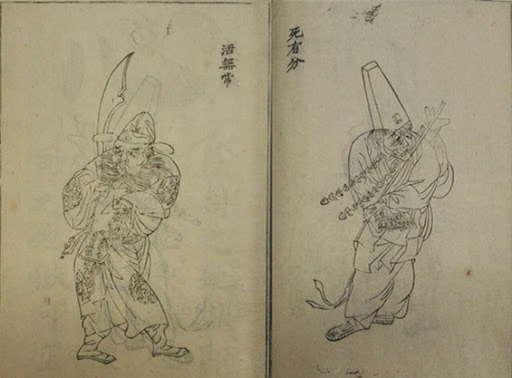
The former wears a black official hat and formal robes, holds brushes and papers in his hands, with blades on his shoulders and torture tools on his belts. He has big bulging eyes and is often laughing.
The latter has dirty, bloodied face, wears a white robe, holds an abacus, carries a sack of rice on his shoulder and has paper money dangling in front of his chest like a necklace. He has a sad frown on his face and is always sighing.
As you can see, there are similarities, but also notable differences from the "iconic" Black & White Impermanences. Whereas the White Impermanence is usually depicted as the cheerful one in white robes, carrying an abacus and wearing strings of paper money, here, he is the sad and grim one.
Their jobs also differ: instead of fetching souls to the Underworld, in the Jade Records, these two are responsible for pushing the dead off the bridges after they have drunken Mengpo's amnesia soup, into the scarlet river so they can reincarnate.
Personally, I view them as a transistory stage between the "Generic Impermanence Ghosts" and "The Two Unique Psychopomps We Know and Love", one strand of the folk god evolutionary process that was captured in written sources.
A Japanese paper goes into another strand in the evolution: the addition of the Black Impermanence. Namely, he might have grown out of a ghost that commonly showed up in City God worship and parades, the so-called "Wall-touching Ghost" (摸壁鬼).
The claim was based on very late Qing newspaper illustrations, where the Black Impermanence was depicted as holding up his two arms like this:
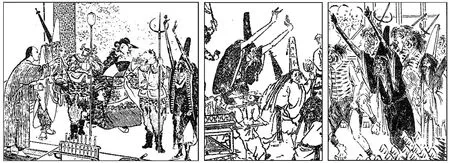
Which was a gesture commonly used by the "Wall-touching Ghost" during parades in the Jiangsu area, who also wore black robes and tall hats.
The author of the paper then dug into sources about the Wall-touching Ghost, and not only found records of the parades, but also a Qianlong era Mulian opera script, 劝善金科, that paired him together with the Impermanence Ghost as fetchers of the dead.

(The two were also given names in this opera: the Impermanence Ghost is named Ba Yang, and the Wall-touching Ghost, Wu Qi.)
Earlier mentions of the Wall-touching Ghost in Qing folklore compendiums, however, didn't depict him as a ghost cop. The story in 夜航船 just described it as a ghost thing that hid between walls and used its chill breath to suck up people's souls.
Another story in the 1878 浇愁集, even though it described the ghost more——dark-faced, holding its arms up like in the drawing, could turn into a cloud of black smoke and disappear into walls——still had it as your typical "ghost shows up, people die" ill omen.
So the paper's proposition is that, after the White Impermanence has separated out of the "Generic Ghost Cop Impermanences" and become his own thing, people in southern Jiangsu built on their existing Wall-touching Ghost and made him into the former's partner, absorbing most of his iconography in the process.
Similarly, the "tall and short" pair-up that was popular in Fujian and spread across Taiwan and SEA might also be a result of parallel local evolution, together with the name Xie Bi'an and Fan Wujiu.
Xie and Fan
Yes! At last, at last, we are getting to the most well-known and popular origin story, a.k.a. the Nantai Bridge Tale.
A summary: Xie Bi'an and Fan Wujiu were a pair of best friends/sworn brothers from Fujian, working as constables for the local magistrate. One day, while they were out on a mission, they saw a storm brewing. Xie went back to grab umbrellas while Fan waited for him under the bridge.
Unfortunately, the downpour soon began, causing the river to flood. Fan, unwilling to break his promise, continued waiting for Xie under the bridge and drowned. When Xie returned and saw his sworn brother's corpse, he hang himself out of guilt and grief too.
(…As a casual reader, I, always wondered why "waiting ON the bridge instead of under it" never crossed his mind as an option. Okay, sure, it was raining. But that's all the more reason to not stand under the darn bridge.)
Touched by their loyalty to each other, the City God/King Yama/Jade Emperor appoints them as ghostly constables, responsible for fetching the dead to the Underworld.
This story bears a lot of similarity to the fable of Wei Sheng in Zhuangzi. Basically, the guy made a promise to meet a girl under a bridge, the girl didn't show up, there was a flood, and, unwilling to leave, he drowned while still clinging to the bridge pillar.
Zhuangzi's opinion of the guy wasn't too high, because honestly, what a stupid way to die.
However, Sima Qian held him up as an exemplar of loyalty and keeping one's word, and the reading stuck. For later folktales about Wei Sheng as well as others that adopted the basic premise, like one tale in the 七世夫妻 story cycle, it also tended to get turned into a straight-up love story.
Though the Nantai Bridge Tale is the most popular version of their backstory, it's far from the only version. One version has them as Tang dynasty officials, working under the historical figure Zhang Xun, who died during the Anshi Rebellion.
While they were trying to get reinforcements, Xie was caught and hung on the city gate by the rebels, while Fan accidentally drowned.
When Zhang Xun was made a City God after the city fell and the rebels killed him, these two also became deified as his attendants.
In another version, Xie was a filial son with an aging mother, who had been wrongly imprisoned because of a friend's crime. During the Lunar New Year, Fan found him crying in the cell, and, upon learning about his sad backstory, released him secretly to visit his mother, on the condition that he returns after seven days.
However, his mother died soon after his return. Busy with her funeral, Xie did not return in time, and Fan, unable to answer to his superiors, committed suicide via drinking poison. When Xie returned and learned of the terrible news, he, too, hang himself.
And these three are far from the only known versions! Like, seriously, there are probably as many variations of the story as there are variations of the objects they held in their hands.
Though some elements stay more constant——using their deaths to explain their iconography, Xie being more commonly associated with the fan, umbrella, and abacus and Fan, chains, everything is subjected to changes and regional differences.
(For example, SEA oral legends tend to associate them with opium. Most of the time, they are constables or mercenaries employed to track down opium smugglers and other criminals, but some have them as Robin Hood-esque opium smugglers.)
Anyways, I hope this long post has offered some insight into the two iconic, yet also somewhat obscure ghost cops. I might add an "Appendix of Fun Facts and Tales" that doesn't fit into the main body of the post, but for now? That will be all.
May the readers who celebrate it have a nice Zhongyuan Festival.
Bibliography:
蔺坤:《无常鬼考源》
大谷亨:《黑无常的诞生与演变—— 以江苏南部的摸壁鬼传说为中心》
陈威伯、施静宜:《七爷八爷成神故事研究》
江義雄:《臺灣「黑白無常」與「范謝將軍」研究》
吳彥鋒:《臺灣七爺八爺傳說及其與信仰關係研究》
中国国家博物馆藏《十一面观音变相》的阐释
劉榕峻:狂放不羈、怪異獨特:談香港藝術館展出的「揚州八怪」
Stephen F. Teiser, The Scripture on the Ten Kings and the Making of Purgatory in Medieval Chinese Buddhism
Fabian Graham, Voices from the Underworld: Chinese Hell Deity Worship in Contemporary Singapore and Malaysia
CBETA: 《地藏王菩萨本愿经》
CBETA:《佛说地藏王菩萨发心因缘十王经》
夷坚志/支癸07,“��彥珍妻”
《金瓶梅词话》,Chapter 74
《醋葫芦》,Chapter 12
《劝善金科》Vol.5, Part 2
The Jade Guidebook: Appendices, translated by David K. Jordan
Journey to the West Vol.1, Chapter 11, translated by Anthony C. Yu
#chinese folklore#heibai wuchang#fan wujiu#xie bi'an#chinese folk religion#chinese underworld#cw: death#cw: suicide#hell#ghosts#ghost month#hungry ghost festival
140 notes
·
View notes
Note
Tell me about your onions.
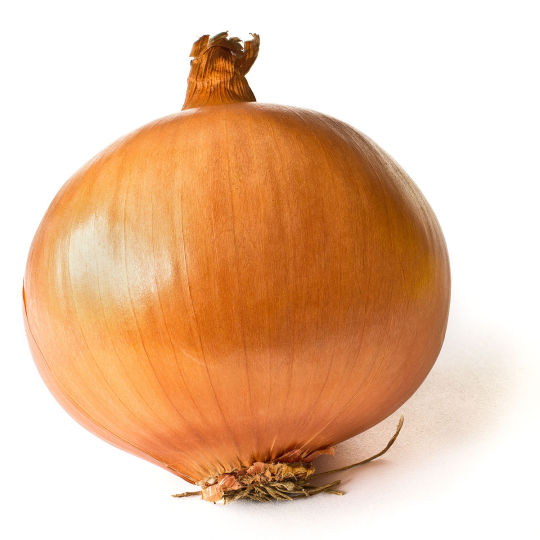
here's an onion. i'm so funny.
ahem.
ok real talk though i've been doing a couple brief dives into the reincarnation aspect of buddhism/hinduism, which haven't been super applicable to COTL so far. which is a shame, bc it has such an interesting take on rebirth and resurrection within the nature of religion.
in COTL, death is seen as semi-permanent and a boon. lamb uses it to their advantage via the nature of game protagonists being able to restart from a save point when they died. the ritual of resurrection is groundbreaking for followers, and i headcanon that the ritual of rebirth is the main reason why TOWW got imprisoned. it is very much a loaded gun in the COTL world.
but buddhism treats rebirth as not only a nature of living, but something that needs to be escaped from. literally something that one must fight to be unshackled from, to break past samsara and reach ascension via nirvana. it's such an interesting viewpoint to consider and explore, especially bc my interpretation of lamb has them never being willing to become this resurrecting figure in the first place. as much as the red crown has been a boon for them, it's also acted as a bind. they will always have both their mortal and godly vices.
in both hinduism and buddhism there are multiple schools of thought that tackle the continuuity of resurrection, aka "what is carried over when one is reborn?"
now suppose narinder did not carry everything he had as TOWW to his mortal form. what is lost, and what is gained?
if i were to adapt samsara into my cotl fics i'd focus less on actual death and more on metaphorical ones. which, ok bear with me here, is a huge part of my personal philosophy.
humans are not static; we grow and develop, and in doing so we shed prior versions of ourselves like metamorphosis. a sort of ego death lite, if you will. when faced with a traumatic event, the person you once were is not the same as the person you are now. that is the kind of metaphorical death i'm talking about; the death of a former self.
but what exactly marks the new self and the old self? nothing, theoretically. we can make the boundary as low or as high as we want.
consider the ship of theseus: if a huge portion of my body is replaced every 7 years, can i definitely say i am who i was 7 years ago? what part of identity and self stays constant, when my personality's changed drastically? am i a stranger with the memories of someone else?
now narrow the boundary. if the self is physically static, then every time a cell dies, the self dies.
using that technical definition, technically i die and am reborn every single second. a metaphorical death and a metaphorical rebirth, and what gets carried over?
something something life and death are two sides of the coin of change.
that's why i kinda keep emphasizing lamb's impostor syndrome crisis about themselves dying in both soul and body during the execution. that's why i divide narinder's life into such stark epochs (mortal, bishop, imprisoned, mortal again). that's why i love treating their afterlife not as a continuity of their character development, but a second chance. ship of theseus, broken down and rebuilt anew.
it's not nirvana. but it's making the best out of your own personal samsara.
and just. there's something so poetic about narinder and lamb reincarnating as gods of death, because the only way to die repeatedly is to live again after each one. a taste of permanence in the impermanent, without ever reaching that finality that they embody as gods. they represent the very thing they are and aren't. it's a paradox that makes perfect sense the moment you remove the black-and-white boundary of life/death that dictates they must be opposites.
and this is what i love exploring. breaking down the barriers of identity and death in the metaphysical sense, in two characters who are defined by so much loss in their lives. (metaphorical) death, treated as redemption, treated as healing.
lamb, offering a hand up to a newly reborn narinder. i died, i got up, and i live.
#my asks#for the record i am very firmly an atheist#i just find studying religious beliefs very fun and very interesting as an expression of the human condition#and also ship of theseus is a tasty thought experiment when applied to human identity#am i a bit cuckoo? absolutely.#:)#long post#long ass fuckin post that i don't expect anybody to read. if you did congrats you get to hear one of my core motivations for narilamb
33 notes
·
View notes